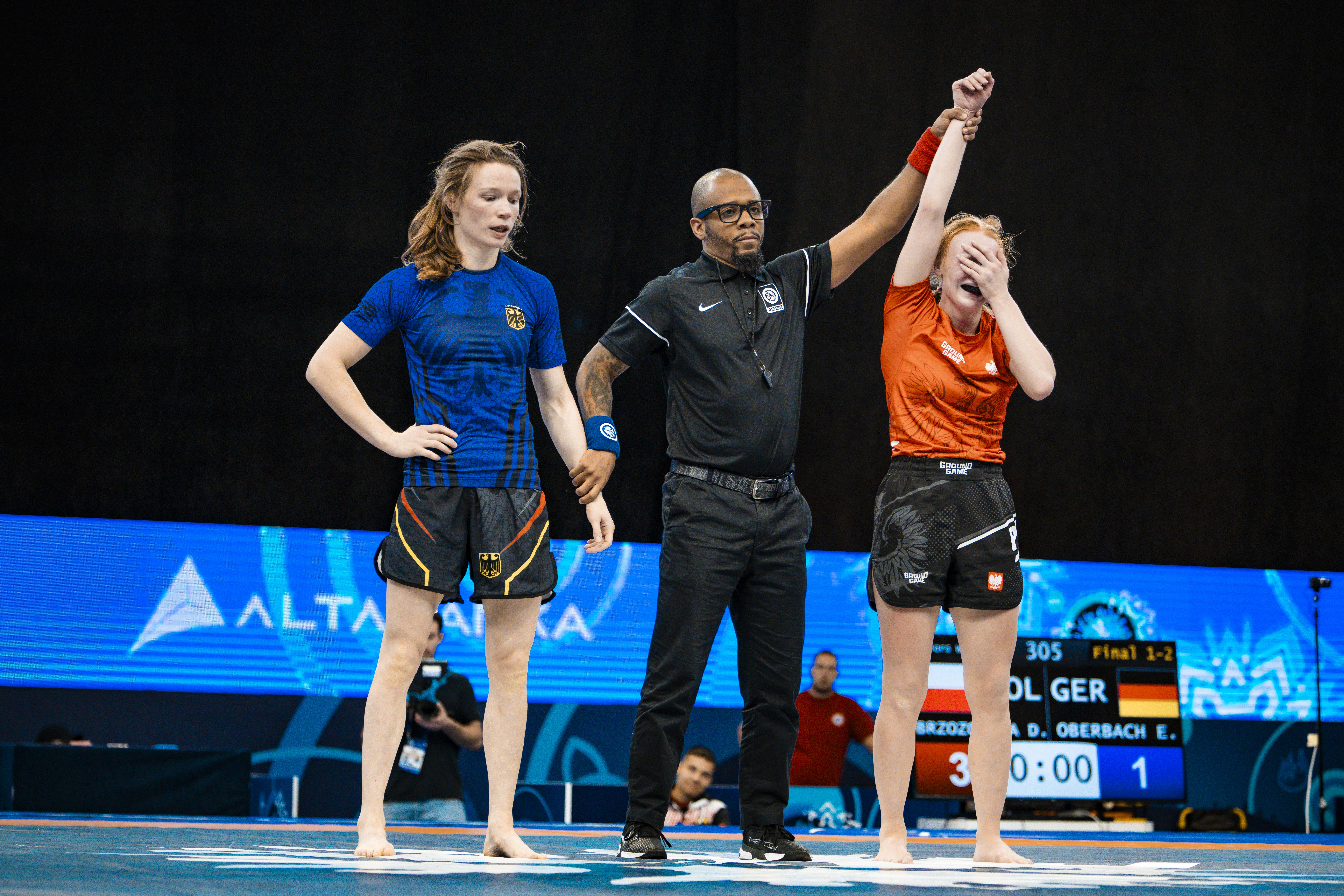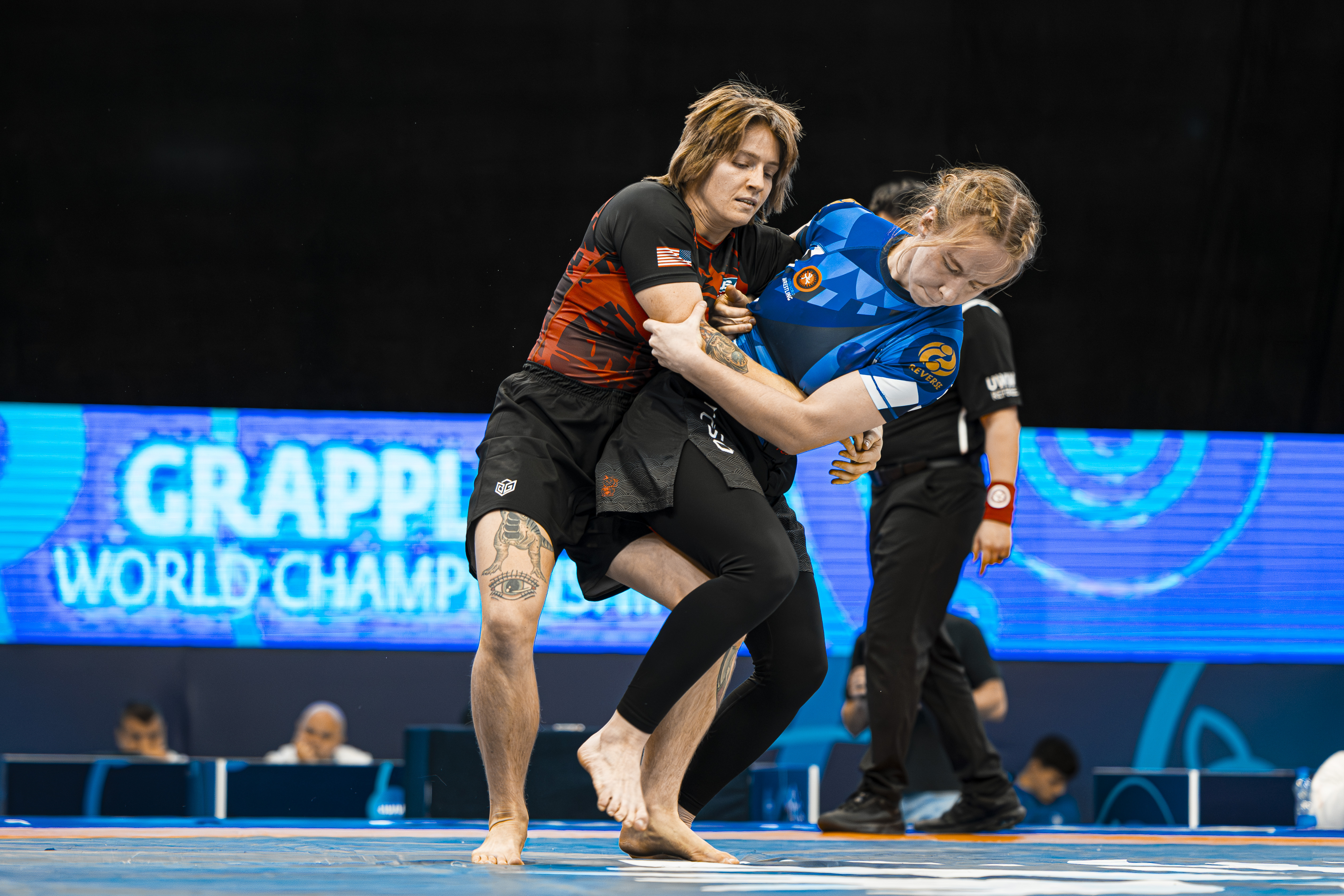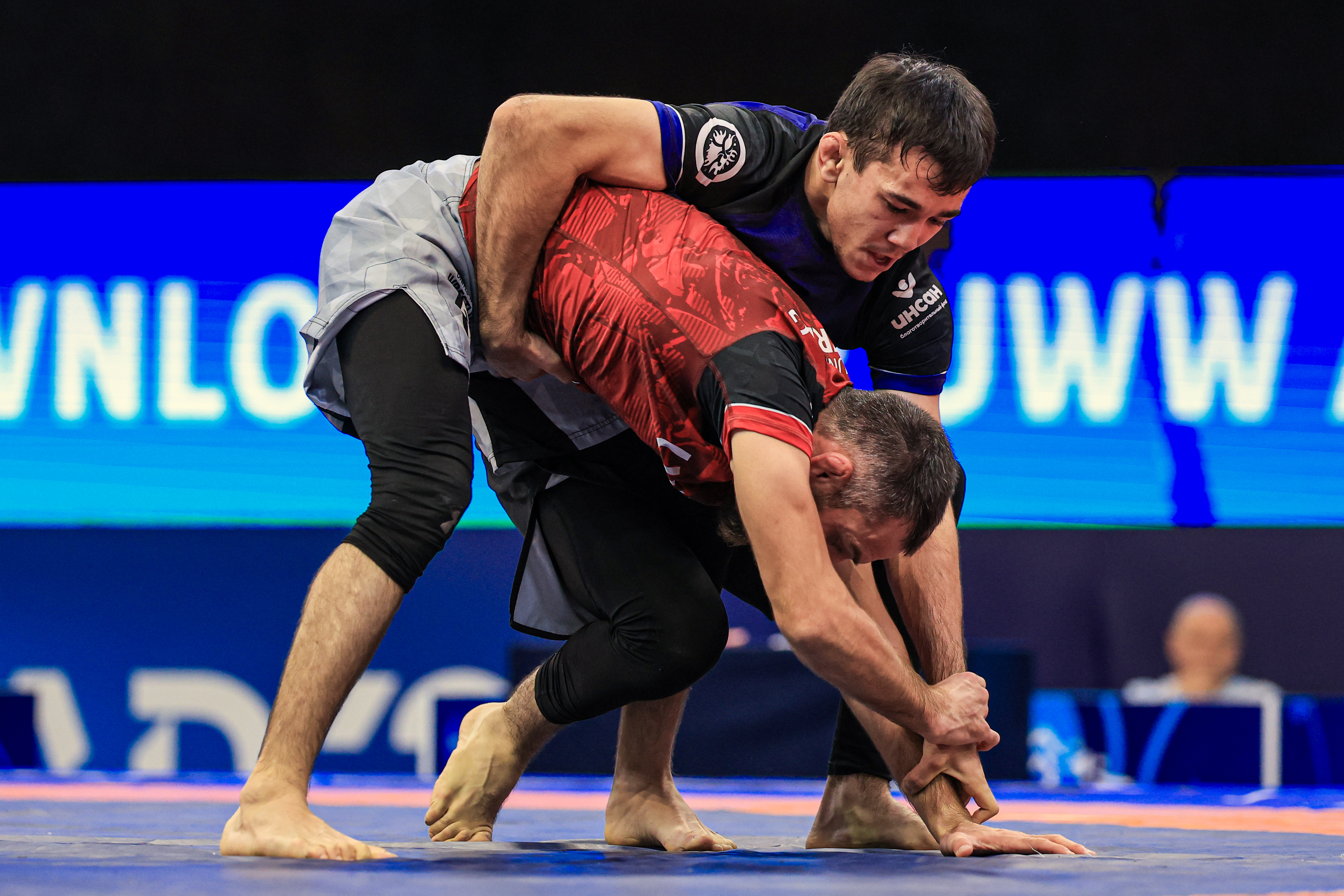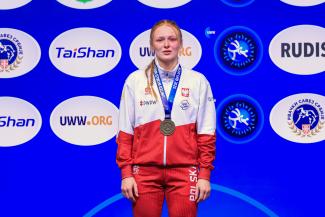NOVI SAD, Serbia (October 15) -- Daria BRZOZOWSKA (POL) had competed against Ellen OBERBACH (GER) twice before their meeting on Wednesday at the World Grappling Championships.
Despite her 2-0 head-to-head record, Brzozowska was cautious of her approach against Oberbach as both met in the 58kg final in Novi Sad, Serbia. Both those wins came in June at the European Open in Warsaw, Poland.
"This was the third time I was competing against her," Brzozowska said. "I won in Warsaw but she must have studied me know and when I saw that she will be in the final against me here, I was thinking that it will be tough match."
 Daria BRZOZOWSKA (POL) reacts after winning the 58kg final. (Photo: United World Wrestling / Kadir Caliskan)
Daria BRZOZOWSKA (POL) reacts after winning the 58kg final. (Photo: United World Wrestling / Kadir Caliskan)
After three wins via submission, Brzozowska went for a similar move in the final, trying a knee bar against Oberbach in the first minute. However, Oberbach defended that attempt and only gave up one point.
Brzozowska then hit a double leg takedown and controlled Oberbach on the mat for more than three seconds to earn two points. Both remained in that position and seeing that the Polish wrestler was not actively trying to make a move, she was called passive. But that was all Oberbach got and Brzozowska won the final 3-1.
"Just 10 seconds before the bout was about to finish, I thought, 'I did it'," she said. "My coach was shouting that just remain in this position and I may have started crying before the match finished."
This was Brzozowska's debut for Poland outside her country and showed that she belongs to the big stage. Trained by her father Chris, the 20-year-old began in wrestling but slowly tried other combat sports. She now trains at her father's club, ASW Panther, in Bydgoszcz, her hometown.
"My father is my coach," she said. "I have not told him that I won gold medal. What a secret to keep!"
 Alsu IANSHINA (UWW) tries to throw Sheliah LINDSEY (USA) in the 64kg final. (Photo: United World Wrestling / Kadir Caliskan)
Alsu IANSHINA (UWW) tries to throw Sheliah LINDSEY (USA) in the 64kg final. (Photo: United World Wrestling / Kadir Caliskan)
In the other women's Grappling final at the World Championships final on Wednesday, Alsu IANSHINA (UWW) defeated Sheliah LINDSEY (USA), 17-4, in the 64kg final to win the gold medal.
Ianshina was clearly the better grappler in the final as she hit two hip-toss to plant Lindsey on the mat with control to lead 2-0. She gave up control as she tried to use an arm-bar and Lindsey reversed the position took a side mount control to lead 2-2 on criteria.
However, that was short lived and Ianshina scored two points for side mount and three more for total control to lead 7-2. As she continued to hold Lindsey on the mat and remain active as well, she got four points for third control and led 11-4.
As both wrestlers grappled, Lindsey got on top after a roll and scored two points. However, Ianshina once again managed to mount and score two points and four-point control and win 17-4.
 Ruslan RADZHABKHANOV (UWW) tries to control Magomedbek TEMEEV (UWW) in the 62kg final. (Photo: United World Wrestling / Amirreza Aliasgari)
Ruslan RADZHABKHANOV (UWW) tries to control Magomedbek TEMEEV (UWW) in the 62kg final. (Photo: United World Wrestling / Amirreza Aliasgari)
In the three men's Grappling weight classes, Ruslan RADZHABKHANOV (UWW) upgraded his silver medal from last year to gold after beating Magomedbek TEMEEV (UWW), 3-3, on criteria in the 62kg final.
At 66kg, Magomed SHAKHBANOV (UWW) submitted Yurii CHERKALIUK (UKR) in quick time to win the final and the gold medal.
Hajimurad PURTIYEV (AZE) gave Azerbaijan its second gold medal of the World Championships when he defeated Davud MAGOMEDOV (UWW), 4-2, in the 84kg final.
RESULTS
Women's Grappling
58kg
GOLD: Daria BRZOZOWSKA (POL) df. Ellen OBERBACH (GER), 3-1
BRONZE: Varvara MASHKINA (UWW) df. Breanna STIKKELMAN (USA), 6-2
BRONZE: Magdalena GIEC (POL) df. Nuraiym MUNAITBAS (KAZ), 12-2
64kg
GOLD: Alsu IANSHINA (UWW) df. Sheliah LINDSEY (USA), 17-4
BRONZE: Mia MONTESINOS PERDOMO (ESP) df. Snezhana MORAR (UKR), 4-2
BRONZE: Adrianna MAZUR (POL) df. Emma ROSINI (ITA), 3-3
Men's Grappling
62kg
GOLD: Ruslan RADZHABKHANOV (UWW) df. Magomedbek TEMEEV (UWW), 3-3
BRONZE: Talgat ZHUMAGALIYEV (KAZ) df. Kiryl AHEIKA (UWW), 2-0
BRONZE: Rafayel KOSTANYAN (ARM) df. Adlan ASUEV (KAZ), via submission (4- 4)
66kg
GOLD: Magomed SHAKHBANOV (UWW) df. Yurii CHERKALIUK (UKR), via submission
BRONZE: Khabib ATLUEV (UWW) df. Jesse SOSA (USA), via submission
BRONZE: Anthony DE OLIVEIRA (FRA) df. Giorgi RAZMADZE (GEO), 7-2
84kg
GOLD: Hajimurad PURTIYEV (AZE) df. Davud MAGOMEDOV (UWW), 4-2
BRONZE: Maxat TOLENDI (KAZ) df. Magzhan MARATKHAN (KAZ), 2-0
BRONZE: Christian FRILLICI (ITA) df. Giuseppe LAMANNA (USA), via forfeit



 Daria BRZOZOWSKA (POL) reacts after winning the 58kg final. (Photo: United World Wrestling / Kadir Caliskan)
Daria BRZOZOWSKA (POL) reacts after winning the 58kg final. (Photo: United World Wrestling / Kadir Caliskan) Alsu IANSHINA (UWW) tries to throw Sheliah LINDSEY (USA) in the 64kg final. (Photo: United World Wrestling / Kadir Caliskan)
Alsu IANSHINA (UWW) tries to throw Sheliah LINDSEY (USA) in the 64kg final. (Photo: United World Wrestling / Kadir Caliskan) Ruslan RADZHABKHANOV (UWW) tries to control Magomedbek TEMEEV (UWW) in the 62kg final. (Photo: United World Wrestling / Amirreza Aliasgari)
Ruslan RADZHABKHANOV (UWW) tries to control Magomedbek TEMEEV (UWW) in the 62kg final. (Photo: United World Wrestling / Amirreza Aliasgari)
Share your thoughts.
Comments